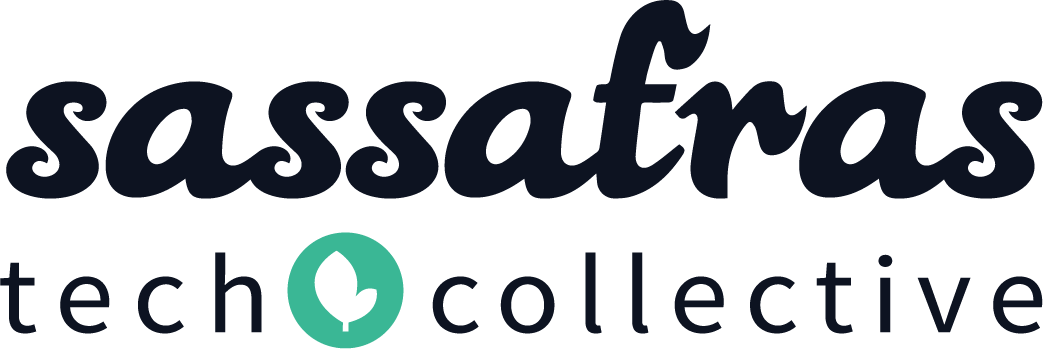Sharing our Guiding Documents: Cultural Values and Practices
We are sharing our guiding documents for anyone interested in learning more about Sassafras, co-ops, or both. These include our Bylaws, Code of Conduct, Cultural Values and Practices, Basic Worker Expectations, Harassment and Bullying Policy, and Conflict Resolution Policy. Below is our Cultural Values and Practices document.
We are all shaped in different ways by systems of domination and oppression, like white supremacy, ableism, patriarchy, capitalism, colonialism, etc. We all work to shift those patterns towards anti-oppressive, liberatory attitudes, practices, and language. This transformation is mission-critical, necessary work for Sassafras in order to be anti-oppressive, truly inclusive, and to move towards our vision.
Unlearning/learning the ways in which systems of oppression impact us is never finished, and this growth often happens through discomfort, mistakes, and conflict. As those happen, we use organizational resources to minimize harm to oppressed people. We work within a transformative justice framework to make amends, and address root causes of harm.
This document describes the workplace we want Sassafras to be. It names attitudes, norms, and habits we value and prioritize. It describes directions to keep moving in, rather than destinations we have already arrived at. The intention is to use this document as a supportive—yet sometimes challenging—guide and reminder. For specific practices we commit to upholding, see the Code of Conduct and Basic Worker Expectations documents.
General
- We make and take opportunities to redistribute power amongst ourselves.
- We ask for and offer help.
- We practice appreciation for each other’s work.
- We commit to being dependable and reliable to all our co-workers.
- We embrace curiosity, play, and creative thinking. We try new things and make mistakes. Mistakes are part of the work we do. We learn from them, and avoid making them personal.
- We celebrate growth and learning (individual and collective).
- We learn and practice skills in consent. We build consent into policy, project approaches, meetings, and day-to-day conversations.
- We learn and practice skills in healthy conflict. We raise concerns early, with curiosity and compassion. Conflict gives us a chance to learn, grow, and strengthen relationships. We support conflict transformation with policy and resources. We approach conflict as “part of belonging, not a precursor to exile.”1 See Conflict Resolution Policy.
- We learn and practice skills in accountability, like self-reflection, apology, repair, and changing behavior.2
- We stick to our commitments and promises to the best of our ability, and communicate clearly and promptly in the event that a commitment cannot be met. With less hierarchy comes a greater degree of autonomy and control, and a greater responsibility to be dependable.
- We value quality over quantity. We do challenging work internally and externally. We value doing work that makes others feel taken care of, builds trust, is easy to use and understand, and meets or exceeds people’s needs. We help each other do this and celebrate successes.
- While urgency is the norm in dominant culture, we work to avoid defaulting to urgency. We help each other slow down. We help each other set a sustainable pace and realistic timelines. We reserve urgency for rare emergencies or strategic moves, and recover afterwards.
Privilege and Oppression
- We actively shift emotional labor towards people with more systemic privilege. We do this because emotional labor tends to land on more oppressed people by default. We value the emotional labor in building relationships (internal and external).
- We value knowledge from lived experience of oppression over academic study. We do not require up-to-date social justice or academic vocabulary, and welcome any language that cares for everyone’s dignity.
- Where we have systemic privilege, we dismantle myths of supremacy, learn to take right space, and learn to shift our habits (including language) to be anti-oppressive and liberatory. Where we are targets of oppression, we claim our dignity, joy, liberation, and healing.1 We help each other do this (including with organizational resources) and celebrate successes.
Teachability and Learningfulness
- We have all the time we need to value each other and offer grace. We deliberately receive and share learnings with each other.
- We acknowledge that we all bring baggage around learning shaped by racism, classism, sexism, ableism, colonialism, and other systems of oppression. For example, there are areas of knowledge that are devalued, or not even recognized as knowledge in dominant culture. A person, especially with systemic privilege, may not recognize their need to learn and be mentored in those areas of knowledge. Another example is that a person may have reservations about being mentored by someone with more systemic privilege. We approach this baggage with compassion and find ways through it together to learn.
- We respect each other’s knowledge and experience. We honor knowledge about emotional intelligence, cooperative culture, oppression analysis, and pedagogical knowledge as much as we honor programming, design, user experience, or project coordination knowledge.
- We work at our edges, with self-awareness about our zone of proximal development. We practice the right to freely ask questions and freely name what we don’t know.
- We offer and receive peer supervision, one-on-one mentoring, and mutual coaching in ways that are consentful, kind, patient, curious, compassionate, and equitable; in ways that disrupt oppressive power dynamics in our field.
- We intentionally share knowledge + experience with opportunity for consent. We are open to yes; no; maybe. We have clear knowledge of roles based on an honest, accurate, judgment-free assessment of where we are. We offer grace around figuring that out together without making assumptions.
- We know learning takes many fun shapes: practice; note-taking; low-stakes experimentation; unpressured, less time/money bound conversations; project-based learning; paired work; concrete examples; classes and workshops; structured written tools; creating products.
- Adapted from Report: Recommendations For Us Right Now From A Future by adrienne maree brown
- From The Four Parts of Accountability by Mia Mingus
